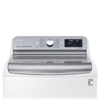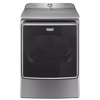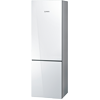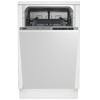Saving energy isn’t the only way to add some extra cushion to your bottom line. In today’s tech-savvy world, there are a variety of gadgets that can make your home slicker, more energy efficient, and even more attractive to a prospective buyer. According to our friends at Green Builder, “Smart House technology is rapidly becoming a sought-after feature for home buyers, with many saying that they only want to purchase a house with such capabilities.”
Here are some energy-saving gadgets that will bring your house up to date in awesome, innovative ways.
Delta® Breez Integrity Fan
 Everyone needs two things when they go to the bathroom: ventilation and ambient noise. This awesome appliance gives your home both. The fan is Bluetooth®-equipped, which makes it able to play whatever tunes you need to sing along to in the shower. But we’re also burying the lead: the fan is also extremely energy-efficient. Get one of these today, and give your vocal chords a warm up. You’ll have plenty to sing about!
Everyone needs two things when they go to the bathroom: ventilation and ambient noise. This awesome appliance gives your home both. The fan is Bluetooth®-equipped, which makes it able to play whatever tunes you need to sing along to in the shower. But we’re also burying the lead: the fan is also extremely energy-efficient. Get one of these today, and give your vocal chords a warm up. You’ll have plenty to sing about!
Whirlpool® Compact Washer and Dryer Combo
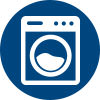 Home washer-dryer setups have saved millions of Americans countless hours at soulless laundromats. But they can also be a little inefficient when it comes to space—particularly if you are of the urban persuasion. Do you put your laundry appliances in the kitchen? In the garage (if you have one?) It’s not an easily answered question. The Whirlpool® compact washer and dryer combo answers it. And it does so with a couple of appliances that are among the most energy-efficient in the biz.
Home washer-dryer setups have saved millions of Americans countless hours at soulless laundromats. But they can also be a little inefficient when it comes to space—particularly if you are of the urban persuasion. Do you put your laundry appliances in the kitchen? In the garage (if you have one?) It’s not an easily answered question. The Whirlpool® compact washer and dryer combo answers it. And it does so with a couple of appliances that are among the most energy-efficient in the biz.
August Smart Lock
 This one isn’t particularly energy efficient—locks aren’t known for running up the ol’ energy bill. But even a small change like upgrading to an Internet-connected lock could pose the difference between a potential home appraiser thinking your home is a modern paradise and them thinking you might as well live in medieval times. OK, maybe the difference between a traditional lock and the smart lock isn’t that drastic. But if you want to transform your living space into a modern pad, the lock could be the perfect accessory for you and your checking account.
This one isn’t particularly energy efficient—locks aren’t known for running up the ol’ energy bill. But even a small change like upgrading to an Internet-connected lock could pose the difference between a potential home appraiser thinking your home is a modern paradise and them thinking you might as well live in medieval times. OK, maybe the difference between a traditional lock and the smart lock isn’t that drastic. But if you want to transform your living space into a modern pad, the lock could be the perfect accessory for you and your checking account.


